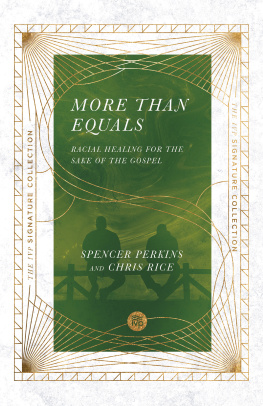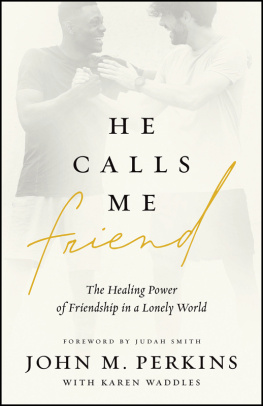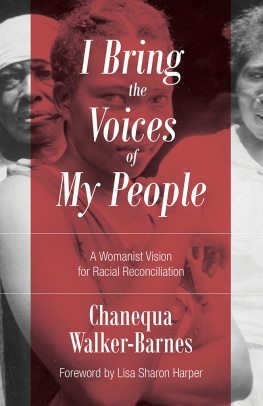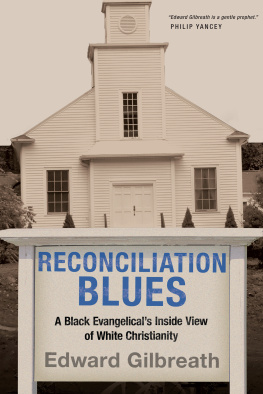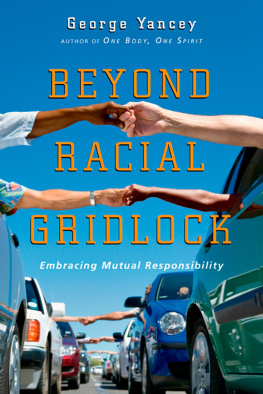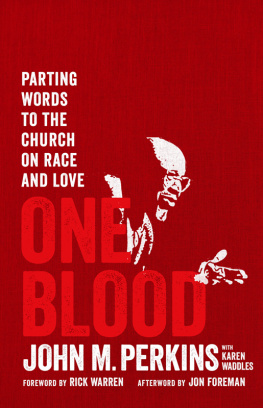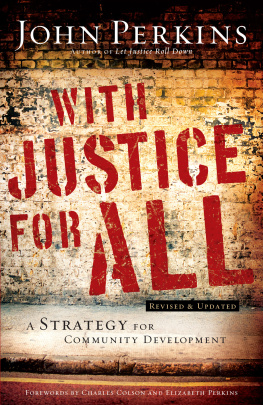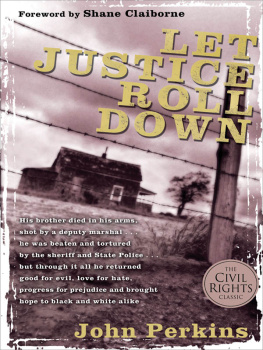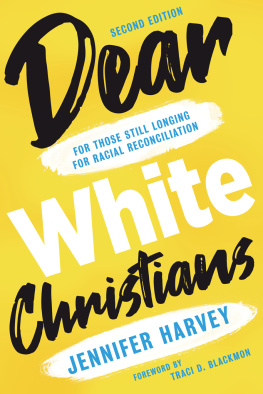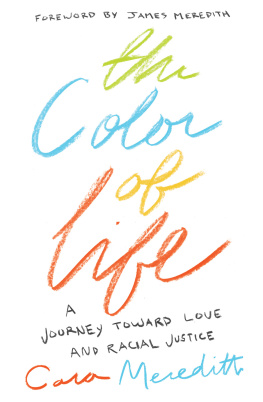Sommaire
Pagination de l'dition papier
Guide
InterVarsity Press
P.O. Box 1400, Downers Grove, IL 60515-1426
ivpress.com
Preface to the Signature Edition 2021 by Chris Rice
Revised Edition 2000 by Nancy Perkins and Chris Rice
First Edition 1993 by Spencer Perkins and Chris Rice
All rights reserved. No part of this book may be reproduced in any form without written permission from InterVarsity Press.
InterVarsity Press is the book-publishing division of InterVarsity Christian Fellowship/USA, a movement of students and faculty active on campus at hundreds of universities, colleges, and schools of nursing in the United States of America, and a member movement of the International Fellowship of Evangelical Students. For information about local and regional activities, visit intervarsity.org.
All Scripture quotations, unless otherwise indicated, are taken from the Holy Bible, New International Version. NIV. Copyright 1973, 1978, 1984 by International Bible Society. Used by permission of Zondervan Publishing House. All rights reserved.
While any stories in this book are true, some names and identifying information may have been changed to protect the privacy of individuals.
The publisher cannot verify the accuracy or functionality of website URLs used in this book beyond the date of first publication.
Cover design and image composite: David Fassett
Images: marble background: NK08gerd / iStock / Getty Images Plus
glittering gold background: MirageC / Moment Collection / Getty Images
silhouette of two men: Pablo Lorenz Pascual / EyeEm / Getty Images
ISBN 978-0-8308-4922-2 (digital)
ISBN 978-0-8308-4864-5 (print)
This digital document has been produced by Nord Compo.
Preface to the Signature Edition (2021)
Chris Rice
What are all you white people doing here? Those are the first words I remember hearing Spencer Perkins say. They are not recommended in books like How to Win Friends and Influence People. Spencers question bothered me. But it changed my life, and it eventually opened up an unlikely journey that bound our lives together and led us to write this book.
Thirty years later, the racial tensions behind that question press on a turbulent new time in the United Stateswhen many black Americans express feeling sick and tired of being sick and tired. When many whites claim theyll never be satisfied while many others have put Black Lives Matter signs in their yards for the first time. When other ethnic groups wrestle with how they fit into this black-white thing.
What was so rare and unusual was that Spencer asked that question not at a street protest but at a church meeting in Jackson, Mississippi, where a collective of blacks and whites shared common life, living and worshiping and working in mission together in an inner-city neighborhood at the margins. Spencer and other black members were also asking themselves, Why are we here? Why are we putting up with white folks who dont get it?
Indeed, why did Spencer bother being with us? At age thirteen he suffered the humiliation of integrating an all-white school. At age sixteen he saw his father, Rev. John Perkins, the morning after nearly being beaten to death by white police officers because of his civil rights work. And at that church meeting he was facing whites like me who were big fans of justice for allas long as it didnt create discomfort or affect benefits for me.
Given how differently we think about and experience America, why bother trying to build a common life and mission together as Christians across racial and ethnic divides? This is the question at the heart of More Than Equals. It is also a question for each new racial time facing Christians in America. Because there is a prayer we cannot escape from. On the night before going to his death on a cross, Jesus prayed for us to become one new people: My prayer is not for them alone. I pray also for those who will believe in me through their message, that all of them may be one, Father, just as you are in me and I am in you. May they also be in us so that the world may believe that you have sent me (Jn 17:20-21).
From Rodney King 1991 to George Floyd 2020
More Than Equals is about the hard, hopeful and holy work of seeking to realize the prayer of Jesus and become one new people across racial divides. Yet in order to see why and how this books message still matters, we must first see how the context has changed.
When Spencer and I wrote More Than Equals in the early 1990s, race wasnt in the headlines and few Christian publishers were putting out books on the topic. But as we wrote, a racial wake-up call struck the nation. In 1991 white police officers in Los Angeles were filmed violently beating an unarmed black man named Rodney King. When a trial found the officers not guilty, the city erupted with protests and violence. Suddenly race became front and center in political and church debate. More Than Equals hit a wave of new interest, and Spencer and I were thrust into speaking and preaching across the nation in schools, churches and communities.
In the new introduction to the revised edition of 2000, I described Americas swings between racial progress and regress. From Spencers father facing the racism of the 1950s to Spencers adulthood in the 1990s, there were areas of undeniable progress in the changing attitudes of white Americans.
But twenty years later came the pandemic of 2020, and with it the disproportionate deaths of black Americans (as well as Hispanics and Native Americans) due to Covid-19. The pandemic became an x-ray revealing deep fractures of racial inequalities in the body politic of America. If that was not enough to expose how race continues to matter, then came the horrific videotaped murder of George Floyd by a white police officer as Floyd cried out, I cant breathe. A new time of racial reckoning erupted across the nation. And then came the terrifying January 2021 mob assault on the U.S. Capitol, including many overt and organized white supremacists, provoked by the president.
These realities revealed the continuing consequences of the United States being the only modern nation that had slavery in its midst from the very beginning. Thirty years after More Than Equals, here are the disturbing facts about the ongoing power of those racist roots: American schools and communities continue to be highly racially segregated, the black poverty rate is 2.5 times the white rate, the wealth gap is worsening, and more black children (two-thirds) grow up in high-poverty segregated areas than they did in 1970. Adding to the pain is how these realities are often interpreted very differently by different groups including in a divided church, in those who find charges of racism to be overblown, in generational conflicts over race emerging in white churches, and in a time of dangerous national impulses from both left and right to move from disagreement to demonization.
Furthermore, while in More Than Equals Spencer talked about pervasive race fatigue in the nation, now a new dynamic has emerged: reconciliation fatigue in the church. The notion of racial reconciliation has come under deserved criticism. Some protest what has often become reconciliation withoutwithout lament, without repentance, without mutuality, without confronting injustices in society and interrupting institutional streams of historical racial disparity. Intensifying this reconciliation fatigue is the sense that this is the version of race relations preferred by many white evangelical Christians. Along with this has been a cultural shift in many quarters away from racial reconciliation to racial justice.

